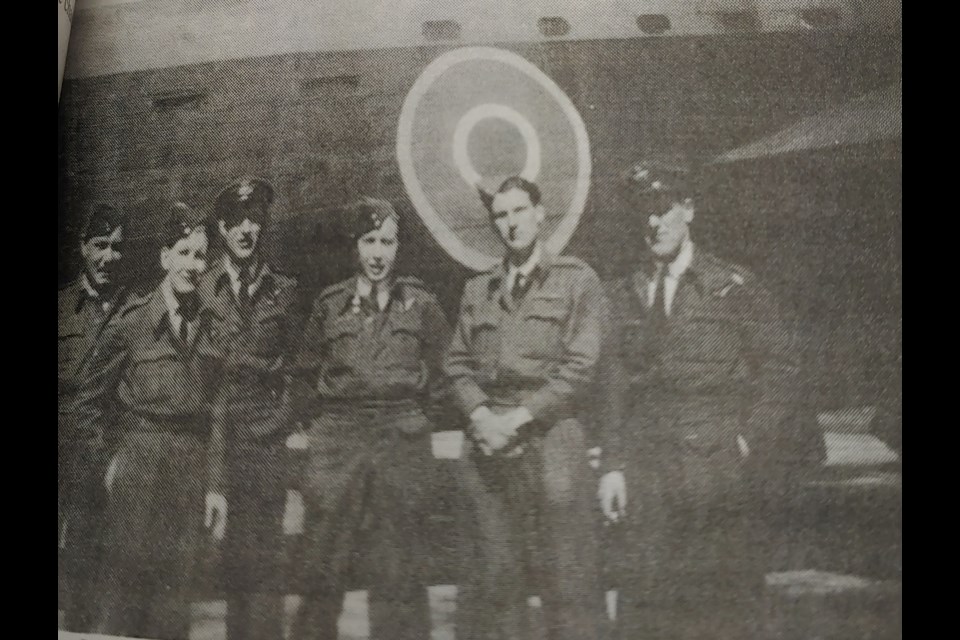MOOSEJAW TODAY - It was mid-1942 and Flight Lt. Bernard (Bernie) Schauenberg and his crew were making their third raid into Germany when they found themselves in the crosshairs of enemy anti-air guns.
Schauenberg, then 22, was flying as a wireless operator/air gunner in a twin-engine Wellington bomber with the Royal Air Force’s (RAF) No. 12 Squadron out of Binbrook, England.
His plane was loaded with a 4,000-pound bomb, ready to be dropped on the Germans’ submarine pens at Brest, France. However, the base was protected like a fortress and bristled with guns.
The Germans shot up the Wellington “pretty bad,” killing the navigator in his seat and forcing the second pilot to bail out. Yet, between the first pilot and Schauenberg, they flew the heavily damaged plane to England with enemy planes pursuing them.
The Assiniboia-born airman was in some pain because he had been shot in the back by an anti-aircraft shell the size of an index finger. “It was the only time that I got shot during the war,” he said.
This heroic effort to bomb the sub pens and help fly the damaged plane home earned Schauenberg the Distinguished Flying Cross (DFC). The airman received the medal in October 1942 from King George VI at Buckingham Palace.
Schauenberg’s first tour of duty ended that November and he celebrated flying 32 missions against German ships. He later became a flight instructor at RAF station Bassingbourn from November 1942 to June 1943.
The itch for active duty was still present, so the RAF posted Schauenberg to No. 49 Squadron at Fiskerton, England, where he flew in four-engine Lancaster bombers. The aircraft enabled him to fly 22 missions against German targets.
Schauenberg later joined No. 167 B.D. Squadron, where one of his duties was to fly diversionary raids into Italy while other Allied bombers flew raids into France and Germany.
“They (the other bombers) were the ones that flew over Germany and blew up dams and other sources of concern,” he said. “While they were doing that raid, our diversionary raids into Italy drew the night fighters. These night fighters would be waiting for us on the return trip.”
While on one of his 10-day leaves in 1943, Schauenberg and his buddies were in a pub when he noticed a girl at another table. He commented to his friends about how beautiful the woman was and how he wanted to meet her.
The girl made a similar comment to her girlfriends, and later, Schauenberg and Sheelagh Halligan spoke. She was from Manchester, England and worked in a factory supplying parts and equipment to keep the Allied forces rolling.
After only two weeks, he proposed, and she accepted. Two weeks later, on Oct. 30, 1943, they married. By then, Schauenberg had completed his second tour of duty, adding another 31 missions in Lancaster bombers to his service record.
The military shipped the couple to Canada, where Schauenberg participated in a heavy transport course in New Brunswick. He was later posted to Edmonton in November 1943 with No. 165 Heavy Transport Squadron, where he flew equipment to the North West Territories.
During one trip from Whitehorse, Yukon, to Aishihik, NWT, Schauenberg recalled temperatures hovering around -61 Celsius, which forced the aircrews to cover the engines with tarps and run gas oil burners underneath all night long.
“The Americans began using the North West Staging Route to supply their posts in Russia and Alaska when German and Japanese submarines started hitting ships with supplies,” he recalled.
“The Russians needed aircrafts, so the Americans sent squadrons of fighters and light bombers all the way to Alaska and then floated them across the Bering Strait to Russia ….”
After Germany surrendered on May 8, 1945, Schauenberg was posted to Biggin Hill, England, to fly goods into the war-torn country and fly out displaced people. Many survivors needed food and medicine — penicillin was a “wonder drug” — because Germany had very little.
Schauenberg’s crew also flew supplies into liberated concentration camps. The hollowed faces of prisoners, rotting bodies and smell of death stayed with him forever, as did the guards’ comments: “What did we do? We did nothing wrong. They are only Jews.”
“In some of those concentration camps … . Well, the rest of the war was nothing compared to that,” he added. “And I’ll never forget.”
Schauenberg was released from the military in 1946 and returned home to Canada with Sheelagh. They enjoyed 61 years of marriage; both died in 2004 and both at age 83.
The Moose Jaw Express thanks Bernard Schauenberg’s son, Kevin, for providing this information about his father, with the assistance of the Assiniboia Times.




